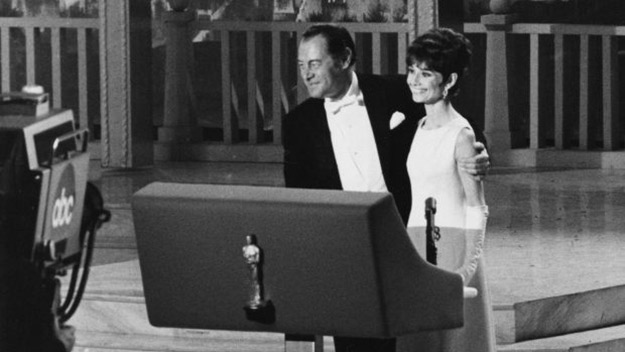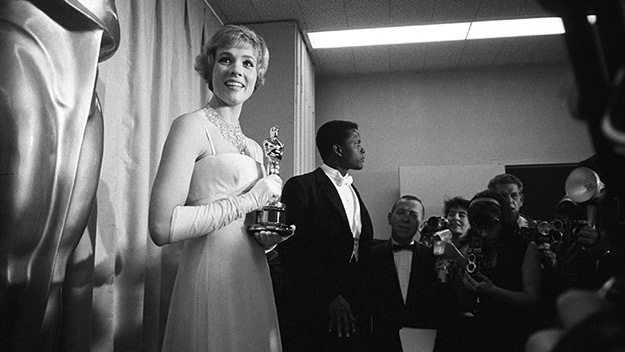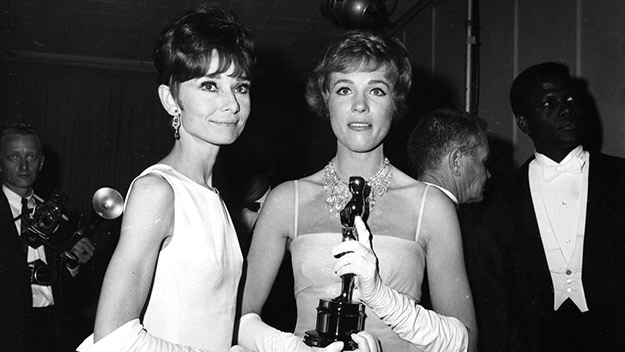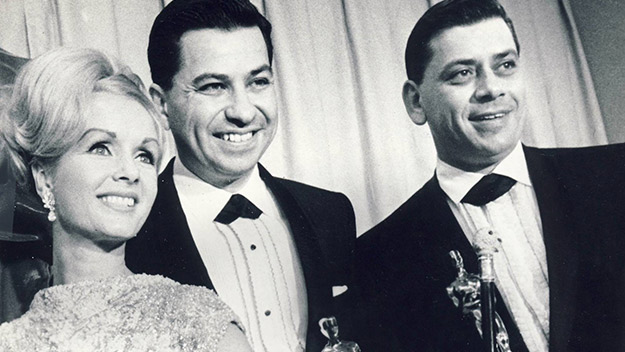Meeting of Stars at the Foot of That Idol Whose Name Is Oscar
Come dream of stardom with Antonio di Benedetto, the author of Zama! Benedetto wrote a dispatch from the 1965 Academy Awards ceremony for the Argentine daily Los Andes. His report is excerpted below in a new translation. His gripes endure.
Any suspicion that this competition bears likeness to festivals (Cannes, Venice, Berlin, etc.) is erroneous . . . Of its 27 awards, 26 are reserved for English language (understand that this means American, with a few notable exceptions, like Hamlet from Great Britain in 1948) cinema. Festivals are fundamentally international and include exhibition before juries, journalists, and artistic and technical delegations from all the films in competition in two or three weeks, with gatherings of theorists and critics, producers and directors, abundant press conferences, receptions, and parallel cultural events.
The 2,800 members of The Academy of Motion Picture Arts and Sciences from Hollywood vote by mail, in two phases that this year span from January 28 to March 27. They can attend special screenings, without any ceremony, to reevaluate finalists, and in the end, the proceedings peter out in a day. The foreign attendance is restricted to those responsible for the five non-English films with the most votes, one of which will receive the 27th Oscar.
. . .

Next to a golden Super-Oscar, the Santa Monica Civic Auditorium proclaimed the “37th Annual Academy Awards,” and then one did the math and could remember that this began in 1928, when that magnificent artist Emil Jannings won.
Guests disembarked 50 meters from the red carpet and police cordons, and before arriving at the glass doors of the Civic Auditorium, if they were actors of some popularity, they had to make their greetings from a podium with microphones, and try to be understood as best as they could with girls begging for autographs from the side galleries. The “teenagers” screeched, they squealed, they were overjoyed, frenetic (their age counted [in English] with the numbers ending in “teen,” 13 to 19): tight pants, soft, long, and loose manes of hair, ultrasensitive photographic cameras, handheld TVs in which they watched the same thing they had before them live.
. . .

They came in ones or twos, slowly . . . Dick Van Dyke stayed there as much as he wanted . . . miming and making jokes at the expense of his starched collar and the rest of his clothes. But others moved on, barely noticed by the glances of adults, perhaps meditative and melancholic. They are those who came from something resembling the depths of the past . . . (oh, the wrinkled face of Ginger Rogers . . . Buster Keaton’s incredible obesity). Age came over them and muddied the radiant image projected from the memory of some kind of fame: their era (Francis X. Bushman, silent film), their Oscar (Greer Garson, Mrs. Miniver), maybe their talent or at least “their moment.” It was, however, a pitilessness that worsened in its effects next to the effortlessly triumphant procession of the bright little figures that are but only seeds—Sue Lyon, Ann-Margret, etc.
But… that’s youth! Faust understands.
A stable set of arches . . . served producer Joe Pasternak for the song and dance show—featuring most of the five films in the running—which, with the fortunate musical return of Judy Garland and the amusing leadership of Bob Hope, supported by seven screenwriters, covered the spaces between Oscar and Oscar.
The awards entered on a little rolling cart like cocktails or desserts in a restaurant and, via Claudia Cardinale or Jean Simmons or Deborah Kerr or Jimmy Durante or Gregory Peck or Sidney Poitier or another or another, they passed into the hands of whoever just heard their name completing the phrase, “The winner is…”
Because there were five final nominees for each award, the group [of nominees] had to arrive . . . at the edge of the stage (the first row of the orchestra) waiting for the opening of the envelope, which concealed until that moment who had received the most votes. The winner rose up, while the other four… well, there’s nothing to explain.
. . .

Possession of the little Hollywood idol (30 centimeters tall, 2500 grams of a cheap metal covered in gold) unleashed legendary loquacity . . . Lila Kedrova—the Best Supporting Actress, for Zorba the Greek—confessed, like so many, that she was “surprised and moved.” She could be believed: she got choked up, was cut off, staggered off; they had to look for her in the middle of the room and guide her by the arm. She was born in Leningrad, lived in Montparnasse, was here briefly for a role, and competed against Agnes Moorehead, Gladys Cooper, Edith Evans, and Grayson Hall.
Julie Andrews played the protagonist in the Broadway triumph of My Fair Lady. But Warner Brothers preferred Audrey Hepburn to play Eliza Doolittle in the film version. The first vote for the Oscars bestowed nominations on the film, its director George Cukor, actor Rex Harrison, and many collaborators, but not Audrey Hepburn. Instead, Julie Andrews became the nominee, for Mary Poppins, and on that night of the Oscars, she was destined for Best Actress.
Audrey Hepburn was entrusted with the envelope for Best Actor. The ripping of the envelope was heard. She read and said, “Rex Harrison.” Rex got up, opening his arms. Audrey ran to the affectionate space that had formed and kissed the man.
My Fair Lady and Mary Poppins—which had the most Oscars? which was number one?—battled away. When it came to deciding the winner of the night, the musical adaptation of Bernard Shaw’s Pygmalion accumulated seven awards and the musical comedy with actors and drawings from Walt Disney followed with five. Scenes from other nominated films were projected: Dr. Strangelove delighted with frank laughs, Beckett ignited a bonfire of applause. Zorba the Greek, Mary Poppins, and My Fair Lady had less.
[My Fair Lady] won without harm or cheer . . . Jack L. Warner, the producer, received the Oscar and spoke. Before finishing, the attendance started to dwindle, like when in the movies the mystery is resolved and the film doesn’t reach a quick ending: the impatient ones leave the room, as if trying to catch the last bus of the night. In the parking plaza of the Civic Auditorium the Rolls Royces waited obediently…
The award winners had been leaving during the function, behind the scenes, in order to head into the successive boxes holding photographers from newspapers, magazines, and news agencies (who captured them posing at the foot of an eight-foot-tall Oscar); film and TV cameramen; journalists looking for news and interviews.
It’s believed that this is one of the roads to fame. Rita Moreno, who won in 1962 for West Side Story, is without work.
Beverly Hilton Hotel, 45 minutes later, 242 tables, each one with 10 people around it . . . The flashes bounce off the roof and their glare tumbles over the cushioned candor of the candles and red violence of roses and carnations.
. . .

The orchestra stopped, the light dimmed. Pretending to be pure gold, the Great Idol Oscar entered in a palanquin carried by four men in red jackets. And behind them, the procession of the little Oscars atop the white cakes that even more men in jackets placed on the 242 tablecloths.
Midnight. The tables cleared. It was early, extremely early, but the ceremony was filmed at eight, and at seven, the stars had to present themselves at the studio. Some of them, those who danced and those subjected to special makeup, at 6:30. But they had consumed the night . . . contemplating Oscar. Gazing at him.
Thanks to Peter Goldberg for assistance with translation.







